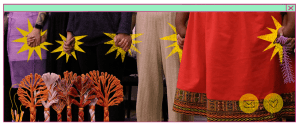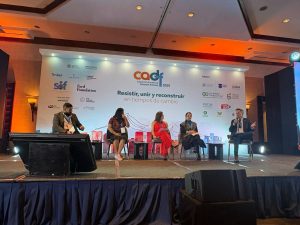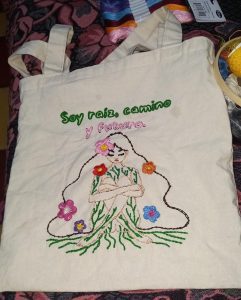
Chain-stitching Resistance: Embroidery as Community Care in El Salvador
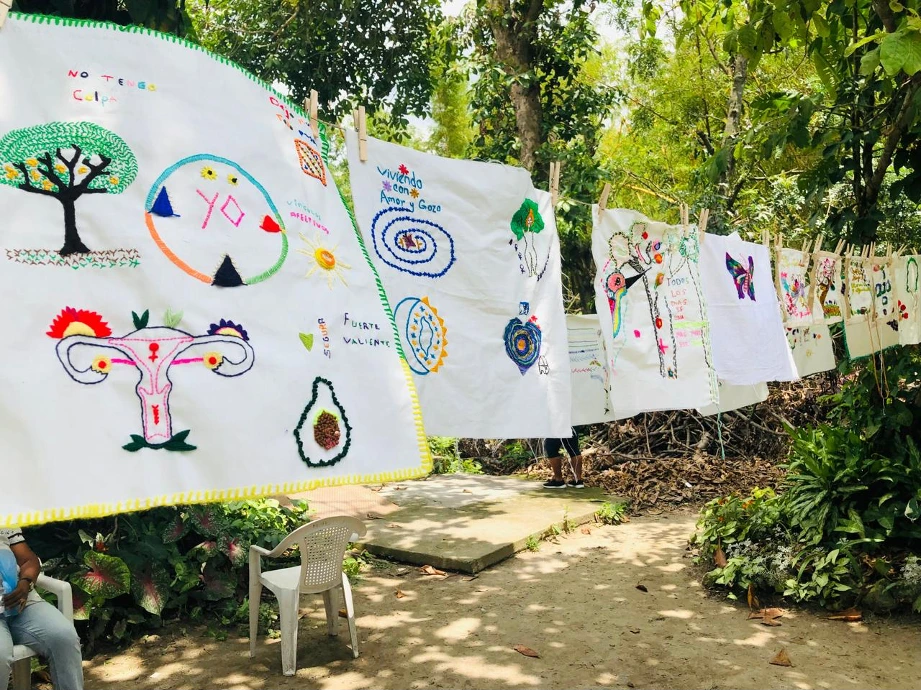
Table of Contents
- Addressing my Body-Territory
- Embroidering Emotions, Mapping Memories
- Safe Spaces and Affective Networks at the Heart of the Workshop
- Memory and Body-Territory
- Chain-stitched Resistances, Bodies in Affirmation
Has it ever occurred to you that the art of embroidery can also be a strategy for emotional healing, collective memory, and feminist resistance? Feminist embroidery springs up in Central America from the cracks in the asphalt like a flower, becoming a tool to reconnect with dignity and collective gathering.
Addressing my Body-Territory
Founded in 2021, the Abordarme Collective emerges with the goal of strengthening the emotional health of women and sexual and gender diverse people by turning embroidery into a healing and transformative language. Their practices are framed within community practices grounded in the body-territory.
Through the workshop “Abordando mi cuerpo territorio” (Addressing my Body-Territory), the Abordarme Collective promotes a creative and reflective experience that links care, body, and territory from an intersectional feminist perspective.
The workshop crops up as a healing and creative response, and it generates a safe space for women and sexually and gender diverse people to recognize their bodies as political territories. From Abordarme’s perspective, to heal the body is also to heal the territory. To give pain a name has the power to dismantle the kind of violence that operates at the personal level.
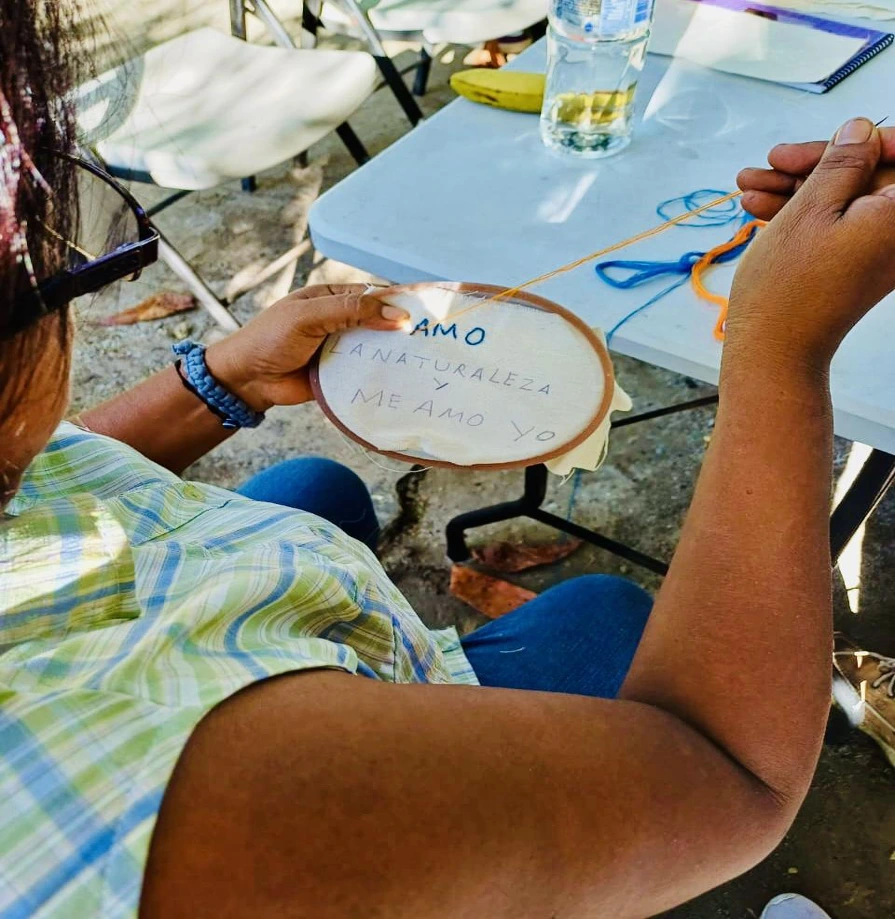
Embroidering Emotions, Mapping Memories
At the workshop, participants explore the bond between body, emotions, and territory. The activities include reflexive writing, sensorial meditation, drawing, free-style embroidery, and the creation of textiles that articulate visual narratives that carry deep symbolic meaning.
Some notable practices include:
Transfer of a personal photograph to fabric: An intimate exercise that connects each woman with the memories stored in her body. Working with one’s own image allows for a new meaning through affection, awareness, and care.
Activating emotional questions such as: “What emotions inhabit my body?” “What do those emotions look like?” “What triggers them?” These questions allow participants to clear the inner space necessary for creative work.
Creation of a collective human figure on a blanket: This symbolic map identifies areas of the body marked by structural violence and gives rise to a shared textile collage.
In addition, the workshop incorporates guided meditations that facilitate introspection and group dialogue as a collective narrative tool. This sensitive approach allows participants to recognize each other and their share lived experiences, while creating emotional support networks.
Safe Spaces and Affective Networks at the Heart of the Workshop
Creating safe spaces between women and people of diverse identities is essential for them to be able to converse with each other freely, to nurture their affection for one another, and to promote mutual recognition.
As part of the process, participants identify and name experiences that constitute emotional, sexual, or economic violence, among others. Translating these experiences into embroidery transforms fabric into surfaces of catharsis and healing, restoring dignity to their experiences.
Creating spaces where they can speak without judgment, feel freely, and heal collectively is a radical form of resistance.
When women and sexually and gender diverse people come together in a space of trust, they are able to build community, create support networks, and redefine their journeys through tenderness, art, words, and listening. This process restores their voice and their capacity to truly see each other. Participants come out of this process stronger and recognize themselves as people with the right to inhabit the world with dignity.
Memory and Body-Territory
The concept of body-territory is the methodological axis of the workshop. Participants understand that the body is not an isolated space; rather it is deeply marked by conditions of class, identity, geography, contexts, and emotions.
Embroidery allows us to:
- Recover individual and collective memories.
- Politicize personal experiences without uprooting them.
- Construct emotional maps that reveal how the territory permeates their bodies.
This ancestral practice functions as a silent and powerful language. With needle and thread, we can embroider more than clothes; we can embroider affection, grief, and hope. In this manner, feminist embroidery becomes a resistance visual strategy that allows us to tell the story of that which is often hard to name.
Embroidering activates images from our childhood, family ties, and moments that have left a mark on our body. These memories are reconstructed and redefined through manual and visual means. We embroider what permeates us: imposed limits, shared fears, inhabited landscapes, and sustained struggles.
When participants embroider a personal photograph, a dialogue opens between past and present, between body and world. Embroidery becomes an act of affirmation: this is who I am, this is what I experienced, this affects me, this is what I decide I’ll transform.
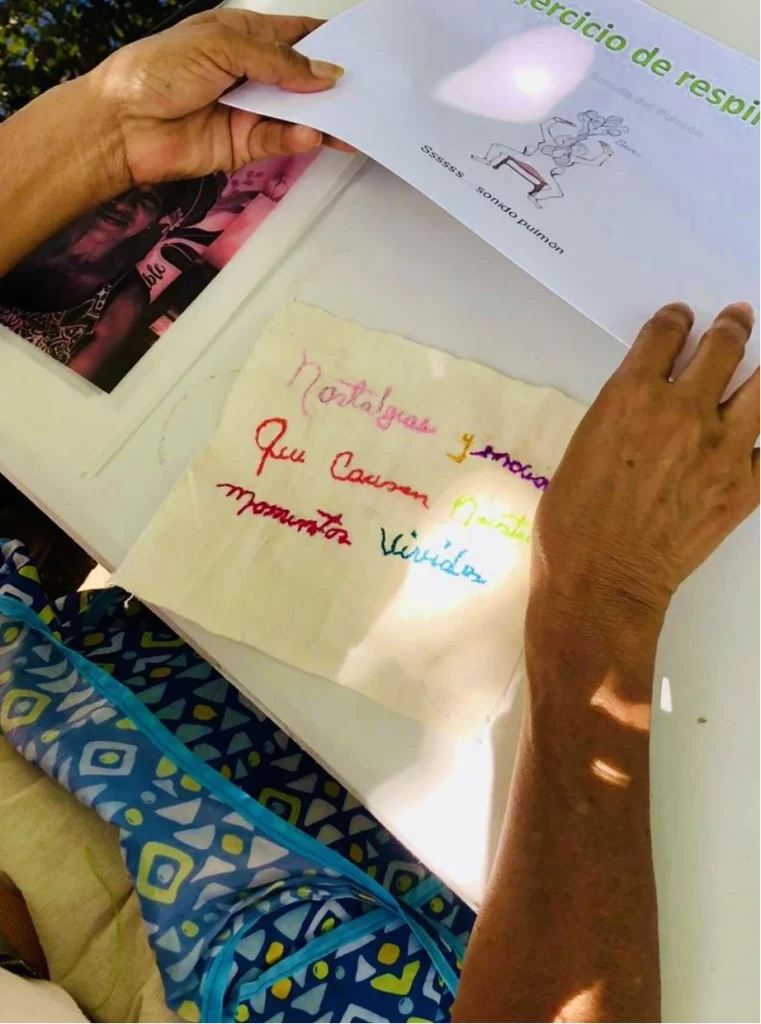
Chain-stitched Resistances, Bodies in Affirmation
“Abordando mi cuerpo territorio” is more than a workshop; it is an embodied practice of feminist community resistance, an affirmation that emerges from the personal, and a tool for collective transformation.
For the Abordarme Collective, the process has generated key organizational learnings, for example, how important it is to be methodologically flexible, to center care, to coordinate with other collectives, and to strengthen feminist networks.
These strategies allow the construction of affective territories where life is affirmed, memory is recovered, and resistance is embroidered with every stitch. Feminist embroidery reminds us that tenderness is also political and that the body-territory is a living archive of transformation.
At FCAM Foundation, we highlight this experience as an example of how art, feminist self-care, and community organizing can transform lives. To heal the body and to chain-stitch networks are profoundly radical actions that sustain the movements for justice in Central America.
Go ahead and like and follow the Abordarme Collective; don’t forget to share their content!
Facebook: Abordarme
Instagram: Abordarme
We appreciate your help in sharing this article and following us on our social media channels:
LinkedIn: FCAM Foundation
Bluesky: @fcamfoundation.bsky.social
Facebook: FCAMFoundation
Instagram: fcamfoundation

